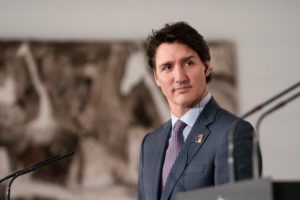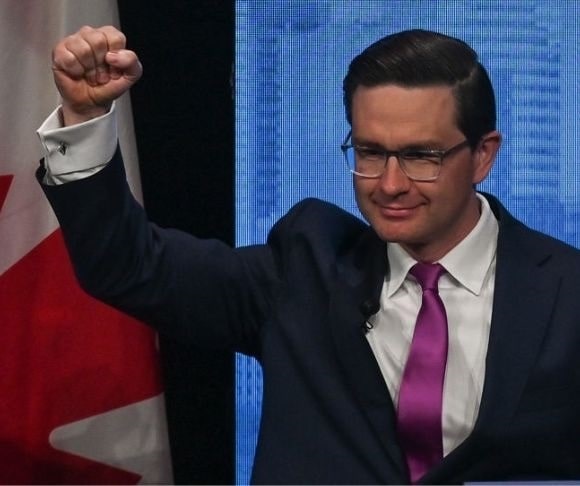This past week, a seismic shift occurred in Canadian conservative politics’ tectonic plates. Pierre Poilievre, who has served on Parliament Hill since his early 20s, secured the leadership role for the Conservative Party of Canada (CPC). Unlike his recent predecessors – Andrew Scheer and Erin O’Toole – the Tories were unanimous in their support of Poilievre. Does Prime Minister Justin Trudeau now have a formidable adversary in the House of Commons? If so, it is about time for the nation’s right-wing base.
Pierre Poilievre and Conservatism’s Identity
 The CPC has been without an identity for quite some time. Former Prime Minister Stephen Harper abandoned conservative principles in office, Scheer failed to revive conservatism, and the party faithful thought O’Toole was a liberal-lite politician. The 2022 leadership race was critical for many right-leaning Canadians since it was a battle for the CPC’s heart, soul, and character. Would registered Conservative voters maintain the status quo with anti-Trucker Convoy moderates like former Quebec Premier Jean Charest and Mayor Patrick Brown, or would they embrace pro-Trucker Poilievre populism?
The CPC has been without an identity for quite some time. Former Prime Minister Stephen Harper abandoned conservative principles in office, Scheer failed to revive conservatism, and the party faithful thought O’Toole was a liberal-lite politician. The 2022 leadership race was critical for many right-leaning Canadians since it was a battle for the CPC’s heart, soul, and character. Would registered Conservative voters maintain the status quo with anti-Trucker Convoy moderates like former Quebec Premier Jean Charest and Mayor Patrick Brown, or would they embrace pro-Trucker Poilievre populism?
Party members were candid in their choice: They wanted someone who ditched the 3×5 card of allowable opinion, called out the leftist nonsense in Ottawa, and supported the forgotten men and women of the Prairies, Maritimes, and rural regions of Canada. As a result, Pierre Poilievre won more than 70% of the votes on the first ballot and swept nearly all 338 electoral districts. This was a record-setting performance, surpassing Harper, who had garnered less than 69% of the vote in 2004. Plus, it had usually taken multiple rounds of votes to determine a clear winner in a CPC leadership election.
The Policy Positions of Poilievre

Pierre Poilievre (Photo by Artur Widak/NurPhoto via Getty Images)
In recent years, Poilievre has acted like a conservative and refrained from emulating the Conservative establishment. This was most pronounced on two issues: the Bank of Canada (BoC) and the Trucker Convoy. While the former is not a subject that sparks fierce debate on the House floor, the latter ignited fiery discussions about tens of thousands of truckers taking over city streets nationwide and the governing Liberals using extraordinary emergency measures to quash opposition.
One side of the Tories shared Charest’s opinions about the anti-mandate convoy: a bunch of unsophisticated criminals who committed the cardinal sin of defying the state and The Science™. Anyone who endorsed the movement should be “disqualified” from leading the Conservatives, Charest noted. The other side of the party concurred with Poilievre, who had this to say about Charest during a May leadership debate: “The average trucker has more integrity in his pinky finger than you had in your entire scandal-plagued Liberal cabinet.” From the start of the protests, Poilievre was clear in his support of law-abiding citizens and opposed those who damaged property and harassed individuals. Essentially, his message throughout the entire saga was this: “I’m proud of the truckers.”
On the subject of monetary policy, Poilievre promised to “fire” the head of the central bank for printing $400 billion for the prime minister and initiating a severe bout of “Justinflation.” He also recently tweeted: “Bank of Canada says #Bitcoin-ers lack financial literacy. This from the same people who promised we’d have ‘deflation’ right before inflation hit a 30-year high. It is our central bank that is financially illiterate. Restore sound money.” His remarks hurt the BoC’s feelings so much that officials responded by rejecting accusations that it prints money and claiming that it is an independent institution that does not bow to federal politics.
Ultimately, the Poilievre putsch in Canada is a campaign of “it’s the economy, stupid,” as the Tories seek to extinguish the flame of Davos-inspired policies, be it central banking or social nudging. In his first speech as party leader, Poilievre said:
“Today, people feel like they have lost control of their pocketbooks and lives. Tonight begins the journey to replace an old government that costs you more and delivers you less — with a new government that puts you first. Your paycheck. Your retirement. Your home. And your country. By tackling Liberal inflation, we’ll put you back in control of your money and your life.”
‘Buzzwords’ and ‘Dogwhistles’

Justin Trudeau (Photo By A. Perez Meca/Europa Press via Getty Images)
Trudeau congratulated Poilievre for becoming the leader of His Majesty’s Loyal Opposition. Speaking from the annual Liberal caucus retreat in New Brunswick, the prime minister then went on to accuse the new leader of espousing “buzzwords,” uttering “dogwhistles,” and making “careless attacks” against Canada’s “institutions that make our society fair, safe, and free.” This, Trudeau asserted, is not a plan for Canadians and is not “responsible leadership.”
In an official address to the Conservative caucus on Sept. 12, Poilievre had a simple response to Trudeau’s comments: “Canadians are out of money, and this prime minister is out of touch.”
But where do the Canadian people stand? According to Abacus Data numbers, Trudeau maintains a 31% approval rating, two-thirds think the country is headed in the wrong direction, and if a federal election were called tomorrow, 35% would support the Conservatives.
“These numbers are a clear signal to the Liberals that many voters, including large numbers of people on the centre of the spectrum, are restless,” explained pollster Bruce Anderson. “The Conservatives are highly competitive, views of Pierre Poilievre are more neutral than some might expect, and not very many people feel good about the direction of the country.”
Is Conservatism Resurrected?
Canada does not maintain a substantial population of Conservative voters. Nearly every federal election cycle, more than half the country casts a ballot for Liberals, New Democrats, and Greens. This is why the Liberal Party has ruled over Canada a lot longer than its right-leaning rival. Conditions favor the Tories as they control more provincial legislatures, although many of them govern like the Grits as soon as they arrive in power. It might be premature to conclude that Poilievre will resurrect conservatism. Harper had left a foul stench by the time he moved out of 24 Sussex Drive. Scheer and O’Toole seemed to be zombie leaders. The Ford family – comprising former Toronto Mayor Rob Ford and Ontario Premier Doug Ford – turned the Conservative brand into what many Canadians saw as a national joke. Alberta lost its way during the coronavirus pandemic.
When someone is running against Trudeau, it should be a cakewalk. But the electorate has shown it is convinced budgets balance themselves, blackface is not racist if a liberal does it, and scandals are not important if the prime minister has nice hair. Therefore, the CPC’s future rests on Poilievre’s shoulders. By the end of the 2025 federal election, will Poilievre’s plight transform into a political Sisyphean tragedy or a Herculean triumph?




